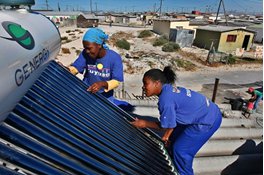First Ever Low-Income Green Home Retrofit Program in Durban Seeks Sponsors
Launched by Green Building Council of South Africa and the World Green Building Council, the 30-home retfofit project plans to leave a lasting impact on the environment and the community long after COP-17.

Launched by Green Building Council of South Africa and the World Green Building Council, the 30-home retfofit project plans to leave a lasting impact on the environment and the community long after COP-17.
For two weeks at the end of this year, the world’s attention will be focused on South Africa as it hosts the 17th Conference of Parties (‘COP17’) international climate change negotiations in Durban. The Green Building Council of South Africa (GBCSA) and the World Green Building Council will be actively showcasing positive progress made in the built environment, and hope to give participants at the climate conference a glimpse into how pursuing green strategies can work in tandem with lifting people out of poverty.
Greening Cato Manor 
The organizations aim to leave a positive legacy in a low-income housing community known as Cato Manor, in the city limits of Durban, to showcase the kind of socio-economic benefits that can be generated from green building activities in response to climate change. Their goal is to retrofit all 30 houses on the cul-de-sac. The cost for each home-retrofit, which plans to install a solar water heater, an insulated ceiling, efficient lighting, a rainwater harvesting system and a heat-insulation cooker, is estimated at R30,000 (approximately $3,800 or €2,800), and the project is currently in need of sponsors.
A funding contribution to the Cato Manor Green Retrofit Project is an opportunity to:
- Showcase commitment to addressing environmental sustainability/ climate change in a way that also generates socio-economic and health benefits for South African communities
- Help create a tangible legacy project from COP17
- Be a part of one of the most relevant COP17 side events -- a site tour on 5th December
- Contribute to what is likely to become South Africa’s first ‘green street’ retrofit in a low-income area
Sponsors will also be recognised in the marketing and publicity efforts related to this demonstration project. The Green Building Council of South Africa needs a firm commitment by Friday 21st October 2011, so please act now if this opportunity is of interest, by contacting Sarah Rushmere at the GBCSA at +27-82-771-5137 or sarah.rushmere@gbcsa.org.za.
The Sustainable Housing Trend .jpeg)
Sponsored Content
COP17’s unique location in a developing country in Africa provides considerable opportunity to explore how poor nations can and are engaging in efforts to mitigate climate change that are unique to their national circumstances and priorities. The Cato Manor project, and sustainable housing more broadly, is one of the most compelling ways that economic development and poverty eradication merge with seamlessly with sustainability. Other low and middle-income countries such as Brazil and Mexico have incorporated energy efficiency and renewable energy features into national housing plans, and South Africa presents its own exceptionally strong precedent for low-income retrofits.
An award-winning project known as “Kuyasa,” in Cape Town, South Africa, retrofitted over 2,300 homes with energy efficiency measures and attracted carbon finance as the world’s first Gold Standard Clean Development Mechanism project. This project proved benefits such as: cost saving, reduced illness and safety risks, skills training and job creation for the poor, as well as reduced greenhouse gas emissions and other environmental impacts.
The Green Building Council of South Africa is hoping to employ the same formula at Cato Manor, for a successful, “Kuyasa-style” impact. While the project is starting with only 30 homes, this will be Durban’s first “green street” – which is only fitting for the host of the UN Climate Talks. The Cator Manor retrofits will add other ‘greening’ elements that Kuyasa didn’t have, such as rainwater harvesting, which allows for better water and food security, and the project team has already garnered interest from local organizations offering services such as LED street lighting, indigenous landscaping, and native fruit trees. 
While in Durban…
A site-tour of a sampling of the retrofit project’s demonstration houses is scheduled for Monday 5th December, followed by an invitation-only reception and a live performance from local musicians in Cato Manor.
Please let us know if you are interested in sponsoring. For a full sponsorship proposal and enquires please contact: Sarah Rushmere at +27-82-771-5137 or sarah.rushmere@gbcsa.org.za


